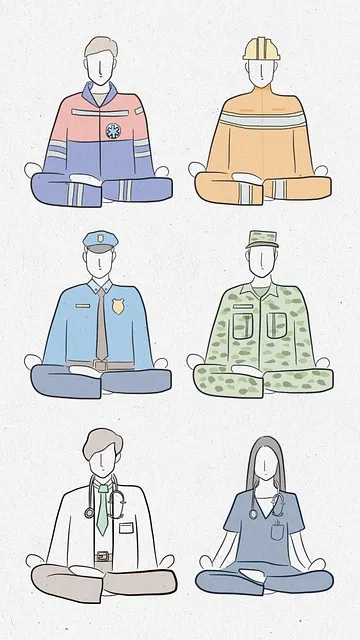Aurora Kaiser Permanente (AKP) enhances community mental health through collaborative initiatives. They assess local needs, tailor programs like Trauma Support Services, and promote Self-Care Practices to reduce stigma. Their outreach focuses on cultural sensitivity, educating providers, and engaging diverse communities. AKP's programs foster support networks, prevent burnout, and improve accessibility for marginalized groups. Measuring success involves tracking key performance indicators (KPIs) and ensuring long-term sustainability through community integration, funding, and partnerships, while participant feedback guides continuous improvement.
Community outreach programs play a pivotal role in addressing healthcare disparities, especially in mental health. This article explores how Aurora Kaiser Permanente effectively targets vulnerable populations through tailored strategies. We delve into the process of understanding community needs, designing inclusive outreach, and implementing engaging programs that foster trust and access to quality mental health services. By evaluating long-term impacts, this initiative ensures sustainability and serves as a model for organizations aiming to improve community well-being, particularly in the context of Aurora Kaiser Permanente’s commitment to expanding mental health support.
- Understanding Community Needs: Identifying Gaps in Mental Health Services
- Designing Aurora Kaiser Permanente's Outreach Strategy: Targeting Vulnerable Populations
- Implementing Effective Programs: Engaging and Supporting the Community
- Measuring Impact and Sustainability: Evaluating Long-Term Success of Outreach Initiatives
Understanding Community Needs: Identifying Gaps in Mental Health Services

In any community, understanding the unique needs of its residents is paramount for effective service delivery. Aurora Kaiser Permanente mental health services aim to address this by conducting thorough assessments to identify gaps in available support. This process involves engaging with local stakeholders, including healthcare providers, community leaders, and individuals from diverse backgrounds, to gather insights into prevalent mental health concerns. By doing so, the program can tailor its offerings to meet the specific demands of the Aurora community.
One critical aspect often revealed through such outreach is the need for enhanced Trauma Support Services and promotion of Self-Care Practices. Mental Health Awareness campaigns play a pivotal role in breaking down stigma and encouraging individuals to seek assistance. Through these initiatives, Aurora Kaiser Permanente strives to create an inclusive environment where residents feel empowered to take charge of their mental well-being.
Designing Aurora Kaiser Permanente's Outreach Strategy: Targeting Vulnerable Populations

Aurora Kaiser Permanente recognized the need to extend its mental health services to vulnerable populations with limited access to care. To achieve this, they designed an outreach strategy focusing on community engagement and cultural sensitivity. This approach aimed to bridge the gap in mental healthcare availability, particularly among diverse and marginalized communities.
The strategy involved developing tailored mental health education programs that consider cultural nuances and barriers to care. By incorporating principles of cultural sensitivity in mental healthcare practice and providing comprehensive healthcare provider cultural competency training, Aurora Kaiser Permanente sought to ensure that their outreach efforts would be inclusive and effective. This personalized approach intended to foster trust, improve service accessibility, and ultimately enhance the well-being of communities often overlooked in traditional healthcare settings.
Implementing Effective Programs: Engaging and Supporting the Community

Implementing effective community outreach programs requires a deep understanding and engagement with the community they aim to serve. Organizations like Aurora Kaiser Permanente play a vital role in promoting mental health services by addressing the unique needs and challenges faced by different communities. By integrating Mental Illness Stigma Reduction Efforts and Burnout Prevention initiatives, these programs can foster an environment of support and understanding. Compassion cultivation practices have proven to be effective in building resilience and strengthening community bonds, ensuring that everyone feels valued and included.
Through collaborative partnerships and culturally sensitive approaches, Aurora Kaiser Permanente’s mental health services strive to bridge the gap between healthcare providers and underserved populations. By actively involving community members in program design and delivery, these initiatives gain traction and relevance, leading to more impactful outcomes. This participatory approach not only enhances engagement but also empowers individuals to take ownership of their well-being, ultimately reducing the Mental Illness Stigma and promoting holistic mental health within the community.
Measuring Impact and Sustainability: Evaluating Long-Term Success of Outreach Initiatives

Measuring the impact and sustainability of community outreach programs is paramount to evaluating their long-term success. Organizations like Aurora Kaiser Permanente play a vital role in this regard, especially when it comes to mental health services. By implementing robust evaluation frameworks, initiatives can assess not just immediate outcomes but also the lasting effects on the community’s mental wellness. This involves tracking key performance indicators (KPIs) such as program participation rates, changes in mental health literacy, and improvements in access to care.
The Mental Health Policy Analysis and Advocacy group emphasizes that sustainability requires a holistic view. This includes assessing the initiative’s ability to integrate seamlessly into existing community structures, secure long-term funding, and foster partnerships with local organizations. Additionally, promoting continuous improvement through feedback mechanisms from participants can enhance programs like Mental Wellness Journaling Exercise Guidance or Mental Wellness Podcast Series Production, ensuring their relevance and effectiveness over time.
Aurora Kaiser Permanente’s community outreach programs have successfully addressed critical gaps in local mental health services, particularly among vulnerable populations. By understanding community needs and designing targeted strategies, these initiatives have fostered engagement and support, leading to improved access to care. Continuous evaluation ensures the long-term sustainability and success of these outreach efforts, benefiting the overall well-being of the community and solidifying Aurora Kaiser Permanente’s commitment to enhancing mental health services in the region.

